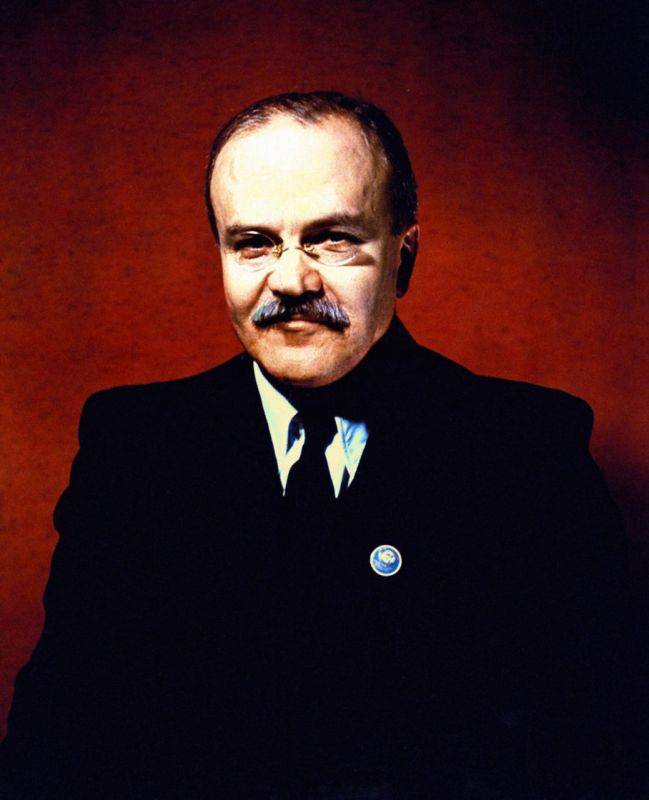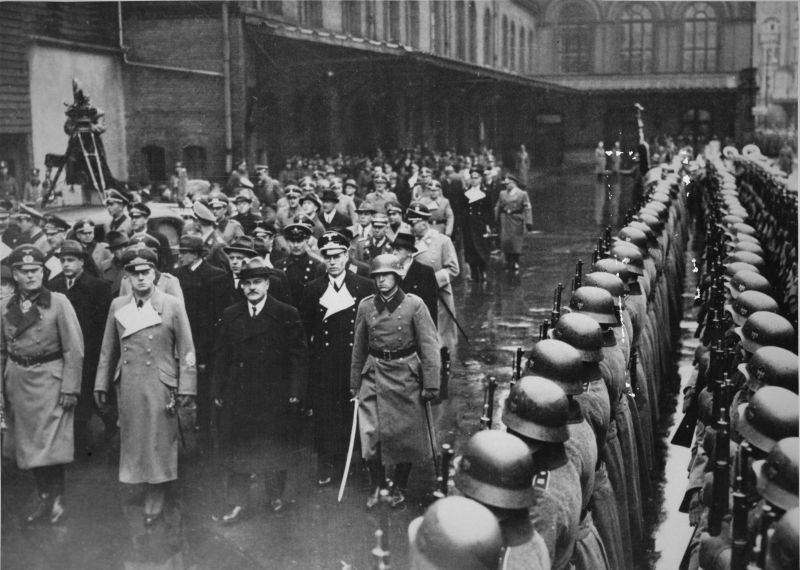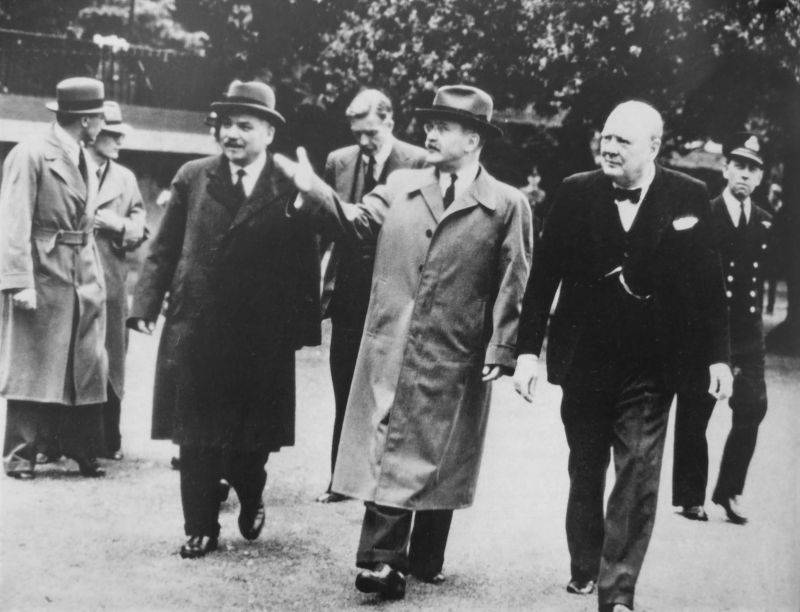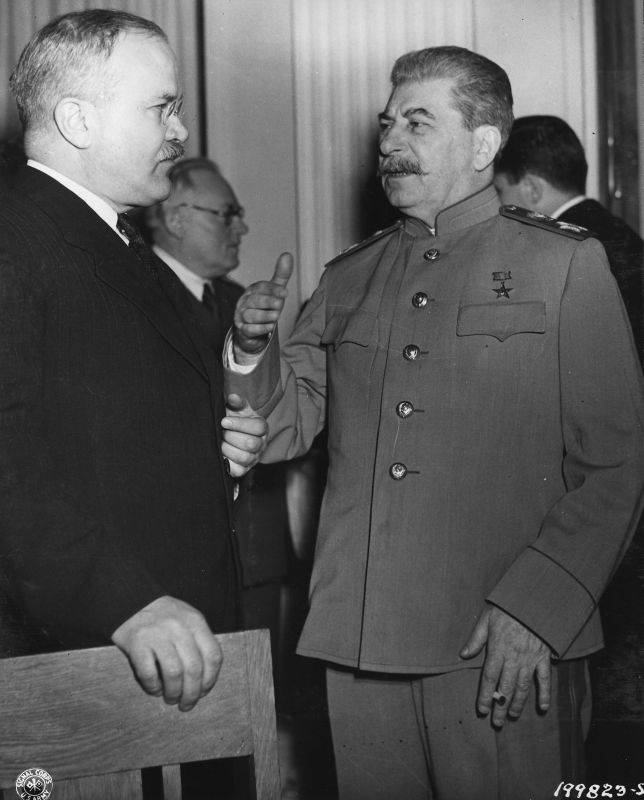Stalin's Marshal of Diplomacy

130 years ago, on March 9, 1890, the future Soviet political and statesman V.M. Molotov was born. The head of the Soviet government from 1930 to 1941, the People's Commissar, and then the Minister of Foreign Affairs of the USSR: in 1939-1949 and 1953-1956. The real marshal of Soviet diplomacy, the creator of the Great Victory, the closest associate of Stalin, who until his death remained a supporter of his policy.
Vyacheslav Mikhailovich did not study specifically as a diplomat. I did not speak a good foreign language. Although during his life he learned to read and understand French, English and German. But for almost 13 years, he defended the interests of the Soviet power and people, conducted difficult negotiations with experienced foreign diplomats and leaders. The largest Western politicians unanimously ranked Molotov among the greatest diplomats of all time. So, the US Secretary of State in 1953-1959. John F. Dulles considered Molotov the greatest diplomat in the world since the beginning of the twentieth century. Vyacheslav Molotov was a conductor of the Stalinist course, a national diplomat. He steadfastly and skillfully defended the interests of our country and people.
Revolutionary
Vyacheslav Mikhailovich Molotov was born on March 9 (February 25, st.). 1890 in the Kukark settlement of the Kukarsky volost of the Yaransk district of the Vyatka province (now Sovetsk, Kirov region). The real name is Scriabin. Father - Mikhail Prokhorovich Scriabin, from the philistines (petty bourgeoisie - urban estate in the Russian Empire), mother - Anna Yakovlevna Nebogatikova, from a merchant family. After school, Vyacheslav studied at the Kazan Real School. There he became acquainted with Marxism, in 1905 he began to support the Bolsheviks, in 1906 he joined the Russian Social Democratic Labor Party (RSDLP).
He had a usual life for revolutionaries of that time: already in 1909 he was arrested and poisoned in exile in the Vologda Oblast. In 1911 he received freedom and completed his studies at a real school. In 1912, Vyacheslav Skryabin entered the Faculty of Economics of St. Petersburg Polytechnic Institute, where he studied until the fourth year. His main occupation was not study, but a revolutionary struggle. Vyacheslav conducted party work, took part in the creation of the newspaper Pravda, where he was the editorial secretary. In 1915 he was sent to the second exile - to the Irkutsk province. At the same time, he adopted a party pseudonym - Molotov.
In 1916, Molotov fled from exile. Arrived in Petrograd, where he became part of the Russian Bureau of the Central Committee of the RSDLP (b). By the time of the overthrow of Tsar Nicholas II, Molotov was already one of the most respected leaders of the Bolsheviks who were at large in Russia. He again entered the editorial office of the newspaper Pravda, became a member of the executive committee of the Petrosoviet and the Petrograd Committee of the RSDLP (b). After February, he was an opponent of cooperation with the Provisional Government and a supporter of the deepening revolution, armed insurrection. But after the return to Russia, many prominent revolutionaries were relegated to the background.
During the Civil War he worked on the economic and party lines. After the Civil War, he again became a prominent figure in Soviet Russia. At the Tenth Congress of the RCP (B) in March 1921, Vyacheslav Molotov was elected a member of the Central Committee, and at the plenum held at the same time, he was actually the first secretary of the Central Committee. In 1922, the post of Secretary General was established, which was taken by Stalin. Molotov moved to a second role in the Secretariat.

Stalin's ally and “marshal” of diplomacy
After the death of Lenin, Molotov became an active supporter of Stalin and remained faithful to him until his death. He opposed Trotsky, Zinoviev, Kamenev, the "right deviators" (Bukharin, Rykov, Tomsky). In 1930, Vyacheslav Mikhailovich headed the Soviet government, replacing Rykov. Molotov worked hard during the years of the first five-year plans and made a great contribution to the growth of the economy, the welfare of society, the country's defense, the implementation of large-scale industrial and infrastructure projects, industrialization, urbanization, modernization, etc.
In May 1939, Molotov replaced Litvinov as the People’s Commissar for Foreign Affairs of the USSR, retaining the post of head of government. Litvinov’s name is associated with Moscow’s attempt to create a collective security system in Europe. The Union pursued a flexible, extremely cautious policy. Litvinov tried to push through the idea of creating a new Entente to the last. In this situation, Russia again became the "cannon fodder" of the West, as in 1914. This did not suit Stalin, he did not want the Russians to fight again not for their own, but for other people's interests. By 1939, the situation in Europe and the world had changed dramatically. The inevitability of World War II became apparent, like the policy of the West to set Hitler's Third Reich against the USSR (the policy of "appeasing" Hitler at the expense of Russia). The course towards creating a collective security system has crashed. It was necessary to avoid the war with the imperialist powers as long as possible and tighten foreign policy, restoring Russian imperial positions (until 1917).
Stalin maneuvered to the last, tried to stay away from the world war caused by the crisis of capitalism, trying to turn the global conflict into an internal affair of the West. That is, the Union had to play the role of a wise monkey on a hill from a Chinese parable that looks at the battle of two tigers. At the same time, Moscow has consistently restored national positions lost after the 1917 revolution (Poland, the Baltic states, Finland, Bessarabia).
Stalin did not want to be the "cannon fodder" of the West, to avoid a new clash of Russians and Germans in the interests of London and Washington. He tried to lead the Russian game according to his own rules. And the conductor of this course was Molotov. Stalin and Molotov managed a lot. Moscow managed to restore many positions of the Russian Empire, to return the Baltic States, Bessarabia, Vyborg, and the western regions of White and Little Russia to Russia. Hitler managed to avoid the blow in 1939, delaying the war until the summer of 1941. The Kremlin has perplexed both England and France, demanding from them a full-fledged military alliance against Germany, and when they refused - concluded an agreement with Hitler. In the winter of 1939-1940, during the war with Finland, a very dangerous situation was avoided. After all, Britain and France, already in a state of "strange" war with the Reich, planned to attack the USSR in Scandinavia and the Caucasus. For Hitler, this situation was simply a miracle - a war between the main opponents. But the USSR managed to deal with Finland faster than the allies landed troops to help the Finns.
As a result, the world war began as a clash of two capitalist camps. It was possible to avoid a war on two fronts - immediately with Germany and Japan. England and the United States, when plans to destroy the red empire by Hitler failed, they had to support the USSR in the war. Stalin and Molotov made the USSR-Russia one of the most important parts of the new world order. Created the Yalta-Potsdam political system.
Thus, the “tandem” Stalin-Molotov very successfully and competently led the foreign policy of the Soviet state during the 10 most difficult years - the Second World War and the Cold War (in fact, already the third world war - between the USSR and the “collective West” headed by from the USA). And there is no doubt about Molotov’s knowledge and personal qualities. He was in his place. Successfully restored the position of the USSR-Russia in the world, was one of the founders of the Soviet superpower.
Winston Churchill, a terrible enemy of Russia and one of the great politicians of the West, gave Molotov this characteristic:
That is, in the West, Vyacheslav Molotov was considered one of the greatest statesmen in the world stories. He defended the interests of the country and the people with all his might, never was a “convenient partner” for the West. It is clear what caused undisguised irritation in the West. Molotov in the West was nicknamed "Mr. No" for his intransigence (later this nickname was "inherited" by A. A. Gromyko). The Foreign Minister became the founder of the "imperial" diplomatic school. Nominated by Andrei Gromyko and a number of other leading diplomats of the USSR.
Also, during the war years, Molotov was deputy, first deputy chairman of the Council of People's Commissars (later the Council of Ministers). Molotov was also the deputy chairman of the State Defense Committee (GKO), and was a member of the Headquarters of the Supreme Commander. It was he who, at the beginning of World War II, spoke on the radio with a report on the attack of Nazi Germany on the Union. On June 22, 1941, at 12 noon, the words of Vyacheslav Mikhailovich were heard throughout the Soviet state: “Our cause is just. The enemy will be defeated. Victory will be ours". Molotov was responsible for development tank industry. For labor services to the Motherland by a decree of the Presidium of the Supreme Soviet of the USSR of September 30, 1943, Vyacheslav Mikhailovich was awarded the title Hero of Socialist Labor with the award of the Order of Lenin and the Gold Medal "Hammer and Sickle."

Opal
Molotov was Stalin's “right hand”; he was rightly considered one of the possible successors of the great leader. Therefore, various intrigues were waged against him. In 1949, Vyacheslav Mikhailovich fell under suspicion: Molotov's wife was implicated in the so-called. case of the Jewish Anti-Fascist Committee, arrested and sent into exile. Molotov was removed from his post as head of the Soviet Foreign Ministry (he was replaced by Vyshinsky). At the same time, Molotov remained one of the deputy chairmen of the Council of Ministers (that is, the supreme). Already in 1952, Molotov was elected to the party’s highest governing body - to the Presidium of the CPSU Central Committee.
After Stalin left (apparently eliminated him), Molotov was one of his possible successors. At the same time, he is an ardent supporter of the continuation of his foreign policy and domestic course. However, he was not eager for power. After the murder of Beria, Molotov tried to confront Khrushchev, but it was too late. In May 1956, under the pretext of a wrong policy on the Yugoslav issue, Molotov was relieved of his post as Minister of Foreign Affairs of the USSR. Then he tried to remove Khrushchev along with Malenkov, Kaganovich, Voroshilov, Bulganin and others, but the so-called. the anti-party group was defeated. Molotov was deprived of the highest posts in the state and the party and sent into exile by the ambassador to Mongolia, then as the representative of the USSR at the International Atomic Energy Agency (IAEA). For such a diplomatic "bison" as Molotov, it was a mockery.
Vyacheslav Mikhailovich did not reconcile and still tried to resist the anti-people course of Khrushchev. Repeatedly appealed to the Central Committee of the CPSU in defense of the Stalinist course (these documents were classified at the direction of Khrushchev). In 1961, he criticized the new edition of the CPSU Program. Molotov was retired and expelled from the party. They restored it in the Communist Party only in 1984, under Chernenko, who was thinking about the full rehabilitation of Stalin and his politics (but did not have time). Until his death, Vyacheslav Mikhailovich Molotov was a solid Stalinist. The great Russian and Soviet statesman passed away on November 8, 1986.

- Alexander Samsonov
- http://waralbum.ru/
Information